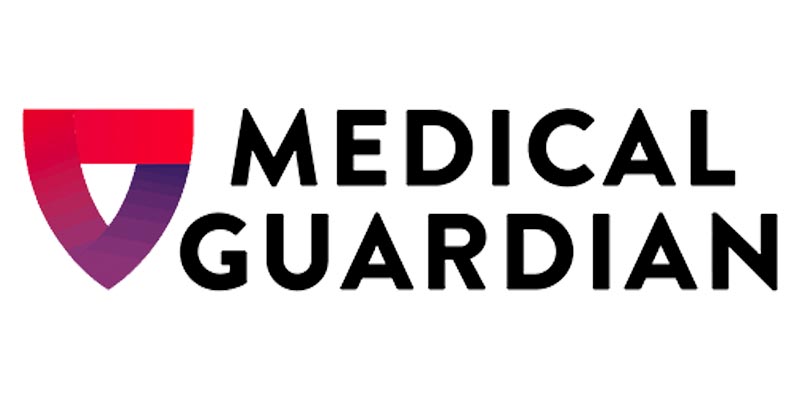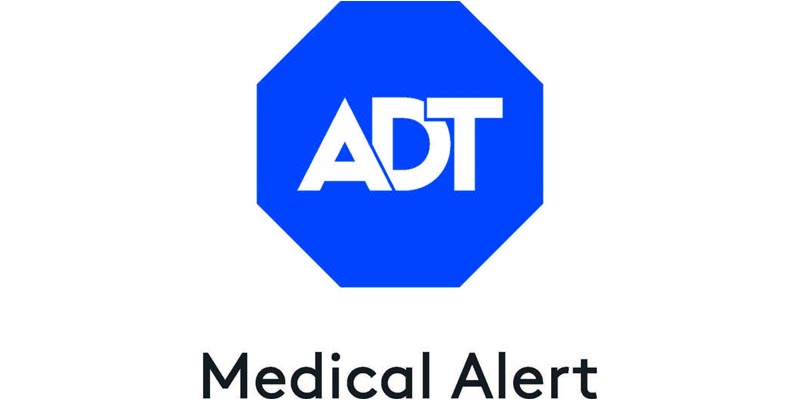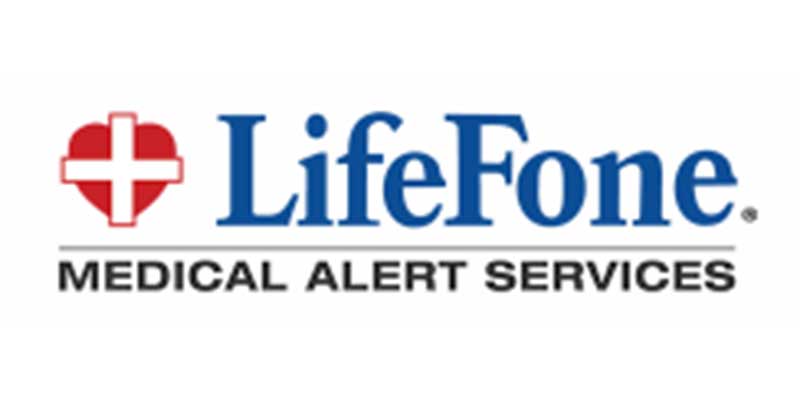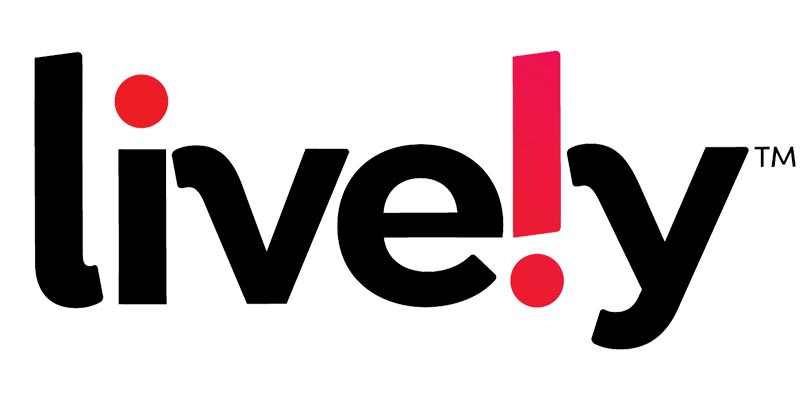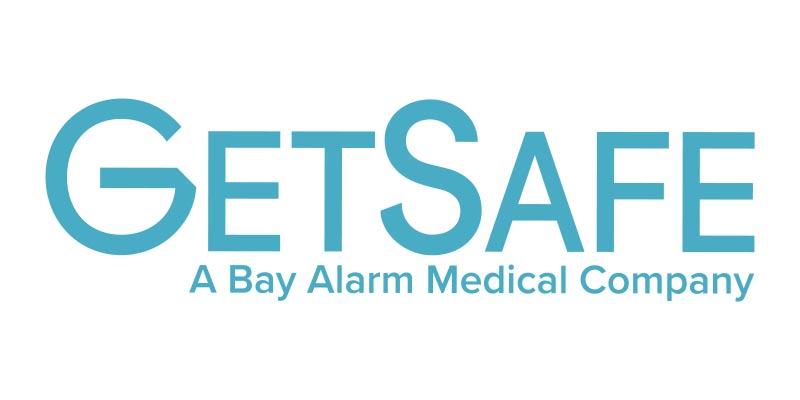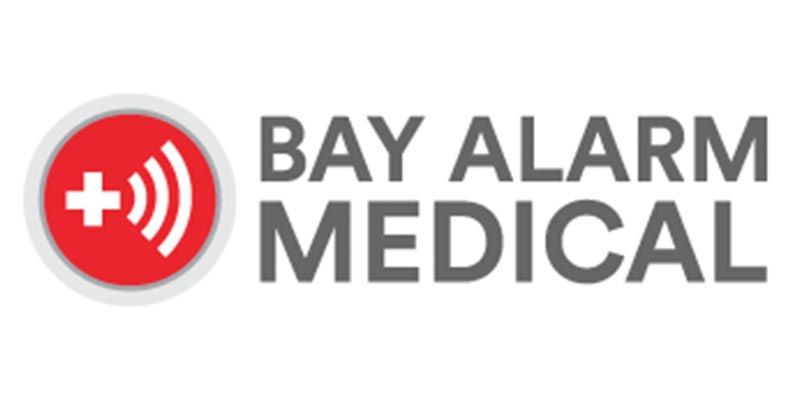Best Medical Alert Systems for Seniors
Updated:
Retirement Living takes an unbiased approach to our reviews. We may earn money when you click a partner link. Learn More
Medical alert systems are essential, life-saving tools for seniors who want to maintain their independence without sacrificing safety. We compared eight of the top medical alert systems for seniors in 2024 to help you make an informed decision. Our list includes buying options for the best medical alert systems for fall detection, medical alert bracelets, and emergency buttons.
- Great Variety
- Call chain for caregivers
- Sleek, stylish wearable devices
Medical Guardian’s tagline, Life Without Limits, reflects the company’s mission to empower customers to live independently. Medical Guardian offers five in-home or mobile systems, a medical alert smartwatch, and the Mini Guardian wearable medical alert button.
- Great In-home Range
- Flexible prices
- 2,000-square-foot range
Personal Living Alert offers affordable prices for medical alert systems with professional monitoring and no long-term contracts. Its in-home and on-the-go systems are affordable and feature the latest technology.
- Great Plans
- Home temperature monitoring
- Fixed-rate service
ADT’s Medical Alert and On-the-Go systems are in-home and portable medical alert systems that cost around $1 per day. Your bill will never increase unless you upgrade medical alert services with ADT’s ForeveRate™ guarantee
- Great for Daily Peace of Mind
- Daily check-in and activity assurance
- Device finder
LifeFone offers many consumer-friendly benefits, like the Subscriber Price Guarantee and the ability to include your spouse on your plan at no additional cost. LifeFone has medical alert systems for home and on the go. Cancel any time and only pay for the time you’ve used.
- Great for Tech-Savvy Seniors
- Nurse on-call
- Compatible with Alexa and Apple Watch
Lively operates on Apple Watches, Alexa devices, and Jitterbug cell phones. Their wearable Mobile2 button is a waterproof medical alert system with enhanced GPS, fall detection, and is FSA, HSA, and HRA eligible.
- Great For Large Homes
- No wearable devices required
- Can service large homes up to five bedrooms
You can buy a wearable medical alert device from GetSafe, but the company caters to consumers who don’t want to wear a button. GetSafe offers medical alert system packages for one-bedroom to five-bedroom homes.
- Great Customer Service
- Vial of Life included with purchase
- Free spouse monitoring
Bay Alarm Medical is a medical alert system offering 24/7 monitoring and trained professionals to help in urgent times of need. Bay Alarm Medical has been protecting its clients for almost 70 years.

- Great Reputation
- Professional installation option
- GPS with 5 location technologies
Lifeline, formally Philips Lifeline, offers an On the Go and a HomeSafe medical alert system. The HomeSafe works with a landline or cell signal. Both systems include access to the My Lifeline mobile app to contact support, test your system, and update your contact list.
Compare Top Medical Alert Systems
| Brand | Starting Monthly Cost | Device Type | In-home Range | Battery Life | Response Time |
|---|---|---|---|---|---|
| Medical Guardian | $29.95 | In-home Pendant Bracelet Smartwatch | 1,300 – 1,400 ft | Up to 5 days | 25 seconds |
| Personal Living Alert | $24.99 | In-home Pendant Bracelet Smartwatch | Up to 2,000 square ft | Up to 5 days | 18 seconds |
| ADT Medical Alert | $29.99 | In-home Pendant Bracelet | 300 – 600 ft | Up to 26 hours | 15 seconds |
| Lifeline | $29.95 | In-home Pendant | Up to 800 ft | Up to 4 days | 30 seconds |
| LifeFone | $24.95 | In-home Pendant Bracelet Smartwatch | Up to 1,300 ft | 24 hours – 10 days | 15 seconds |
| Lively | $24.99 | Pendant Smartwatch Amazon Alexa Jitterbug phone | N/A | Up to 40 hours | 15 – 20 seconds |
| GetSafe | $29.95 | In-home Pendant (optional) | Up to 800 ft | Up to 5 years | 25 seconds |
| Bay Alarm Medical | $24.95 | In-home Pendant Smartwatch | Up to 1,000 ft | 2 – 5 years | 10 seconds |
Our Recommendations
Personal Living Alert medical alert devices have the longest range of all systems we compared, up to 2,000 linear feet. At just 10 seconds, Bay Alarm has the fastest advertised response time, and LifeFone has the most affordable fall deduction add-on service.
Here are a few other factors for buyers to consider, based on our experience testing medical alert devices:
1. Consider services beyond just medical alert and fall detection. Today systems are much more advanced, and many brands offer other helpful monitoring and safety services.
- Personal Living Alert also offers an anti-wandering home system, medication dispensers, and cordless pads and mats that send alarms when the senior steps on it or moves from it.
- LifeFone has a daily check-in feature, which can be a great compromise for families who want peace of mind and seniors who don’t want a caregiver to come to their house to remind them to take their medication or make breakfast.
- Lively is a good option for anxious seniors, or those who don’t have family close by. They encourage their subscribers to reach out even if they hear a weird knock at their door or smell a possible gas leak.
2. The service range (how far outside your home the medical alert system works) is one of the most important features you should consider when comparing home-based systems. Test the service in every room of your home, as well as the garage, driveway, and backyard. A system with a limited service range could leave you or a loved one unable to call for help during an emergency. Depending on where you are in the home, you may not be able to hear the response from the base system (in the case of no response, the company will contact emergency services).
3. Fall detection is best for detecting fall movement and then no movement shortly after. This is an important distinction for those considering fall detection monitoring, as the system will only automatically initiate communication with the response team if no movement is detected following a fall. If you’ve fallen and need help, but are still able to move, you’ll need to manually press the button to engage the 24/7 call center.
4. All of the companies featured on this list have U.S.-based monitoring centers and water-resistant buttons. This is important for fast response times and all-day use.
5. Test the system in multiple locations throughout your home upon delivery. Many of the medical alert companies we featured here have return policies, which can help esnure the system you bought works within your home layout. Many brands will request that you press each button in every room to check whether you can hear the response team and whether your connection is strong enough.
6. Research important features and compare offerings across companies before contacting a brand for more information. (This guide helps you do that.) Our research indicates that some companies implement sales tactics when prospective customers comparison shop on the phone. Utilize online chat features and study the support and FAQ pages online to get an idea of services offered, so you can make a more informed decision.
Best Medical Alert Systems for Seniors, Reviewed
Medical Guardian
Great Variety
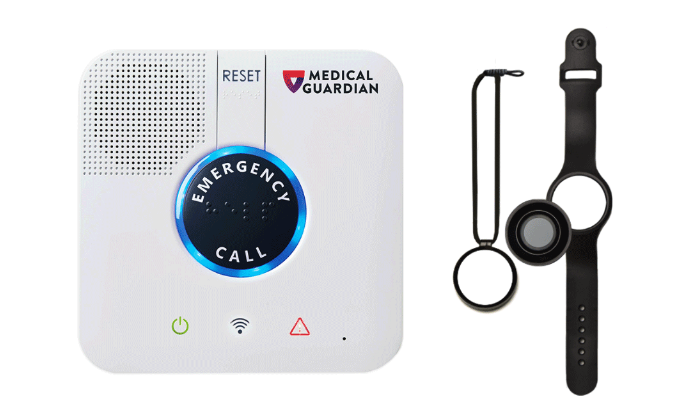
- Plan costs: $29.95 – $44.95/month
- In-home range: 1,300 – 1,400 ft
- Device type: In-home unit, pendant, bracelet, smartwatch
- Fall detection: Yes, $10/month
- Battery life: 1 – 5 days
- Response time: 25 seconds
Medical Guardian offers five user-friendly medical alert systems, including two in-home and three on-the-go options. They feature two-way communication, GPS and step tracking, and a mobile app to organize your personal health and safety information.
They offer several add-on features, including fall detection, a separate 911 button, and Care Circle Alerts. The Care Circle Alert will send text or email notifications to family and friends to keep everyone in the loop if you experience an emergency. This feature is especially beneficial for seniors with an extensive care network or multiple adult children.
Their on-the-go systems are sleek and discreet and come in a variety of colors and styles. If you are new to medical alert systems, you can take their quick three-question product quiz to help you decide which option is right for you. However, to receive your quiz results, you must enter your name and email address so they can send the results to your email.
We also like that Medical Guardian is transparent about system pricing. The cost of their products, services, and add-ons is easy to find on their website, and there are no hidden fees or contracts. Medical Guardian values customer feedback and often uses it to improve their devices. They currently have 3.6 out of 5 stars on Trustpilot based on over 900 customer reviews.
To learn more, read our comprehensive Medical Guardian review or view plan options on their website.
Personal Living Alert
Great In-home Range
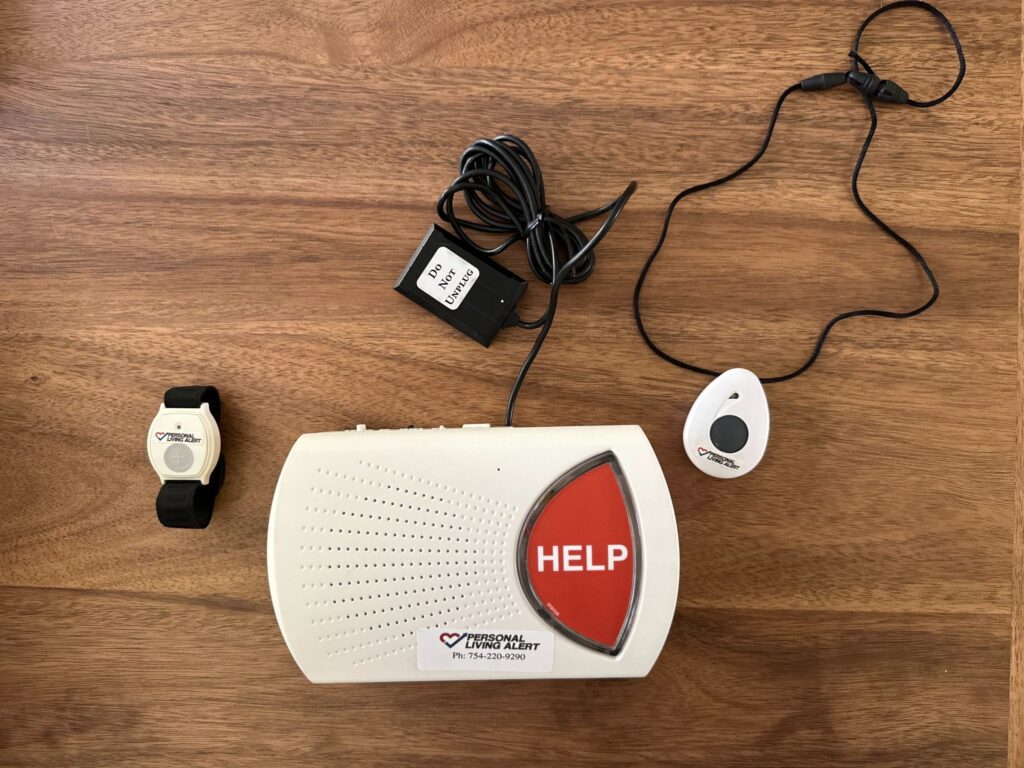
Retirement Living’s senior editor tested the PLA In-Home System
- Plan costs: $24.99 – $44.99/month
- In-home range: Up to 2,000 square feet
- Device type: In-home unit, pendant, bracelet, smartwatch
- Fall detection: Yes, $8/month
- Battery life: Up to 5 days
- Response time: 18 seconds
Personal Living Alert has a great selection of four different in-home and mobile medical alert systems. If you’re concerned about getting help during a power outage, the in-home unit is made with hospital-grade equipment, features an impressive 60-hour backup battery, and has a range of up to 2,000 square feet.
During our test of the PLA in-home system, agents responded to our help request in just 18 seconds. It’s also one of the few medical alert companies offering a anti-wandering service.
Personal Living Alert does not charge an equipment fee; however, watchbands, pendants, and warranty protection plans will cost extra. The smartwatch has an additional $99 activation fee, and you must pay for the first three months of your membership upfront. In total, your initial payment will cost anywhere between $75 and $230 plus $22 for their flat-rate shipping.
To learn more about our experience testing the PLA in-home medical alert device, read our comprehensive Personal Living Alert review. Then, view plan options on their website.
ADT Medical Alert
Great Plans
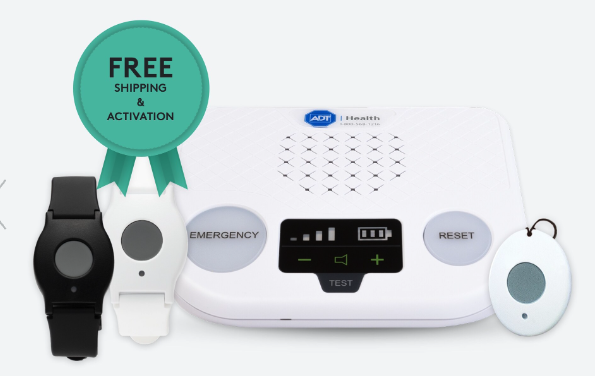
- Plan costs: $29.99 – $39.99/month
- In-home range: 300 – 600 ft
- Device type: In-home unit, pendant, bracelet
- Fall detection: Yes, $33/quarterly
- Battery life: Up to 36 hours (on-the-go base unit)
- Response time: 15 seconds
ADT is a well-known home security company that also offers medical alert systems. Their medical alert systems come with a ForeveRate™ guarantee, which means the price for your service will always remain the same, making this an excellent option for budget-conscious customers. ADT Medical Alert currently has a 4.7 out of 5 stars with ConsumerAffairs based on 482 customer reviews.
They offer two different in-home systems and one on-the-go system. Customers appreciate their free two-day shipping, free activation, and that there are no hidden fees or long-term contracts.
One of the perks we like about their in-home systems is the temperature monitoring feature, as seniors are more susceptible to temperature-related illnesses caused by extreme heat or cold. The ADT in-home units detect and alert you of unsafe temperatures in your home, making this a great medical alert system for seniors who want to be proactive against temperature-related emergencies.
One downside of ADT Medical Alert is that the in-home units only have a range of 300 to 600 feet, which is significantly lower than many competitors’ ranges. The base unit backup battery also only lasts 12 to 20 hours, which is also much lower than that of other medical alert systems. A representative told us that existing home security customers may be able to add medical monitoring to their accounts, depending on your plan type.
To learn more, read our comprehensive ADT Medical Alert review or view plan options on their website.
Lifeline
Great Reputation
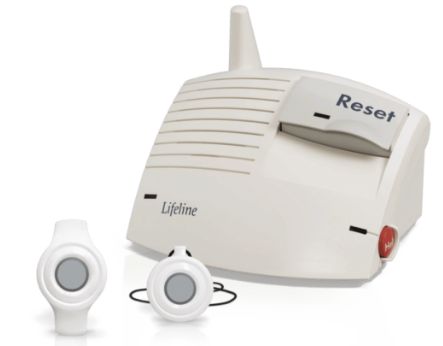
- Plan costs: $29.95 – $49.95
- In-home range: Up to 800 ft
- Device type: In-home unit, pendant
- Fall detection: Yes, $15/month
- Battery life: Up to 4 days
- Response time: 30 seconds
Lifeline, formally Philips Lifeline, has served over 7.5 million seniors since 1974. Although their selection of medical alert systems is limited, they offer affordable prices and a variety of safety features. Lifeline offers two medical alert systems: one in-home system and one on the go. The in-home system features two-way communication with a trained care specialist and automatic fall detection.
On their website, you can take their three-question product selection quiz to help you decide which system is right for you. Unlike Medical Guardian’s product quiz, Lifeline shows your results immediately without having to input your personal contact information first.
Their on-the-go system includes an advanced GPS locator that uses five different technologies, including Wi-Fi and two-way voice communication, to ensure help can find you no matter where you are.
Philips Lifeline is transparent about its pricing, and all fees and optional add-on costs are displayed clearly on the website. At checkout, you will pay for your first month of service, a one-time $99.95 setup fee, and $29.95 for shipping. You can also have a professional install your system for an additional $99, although this is optional.
To learn more, read our comprehensive Philips Lifeline review.
LifeFone
Great for Daily Peace of Mind
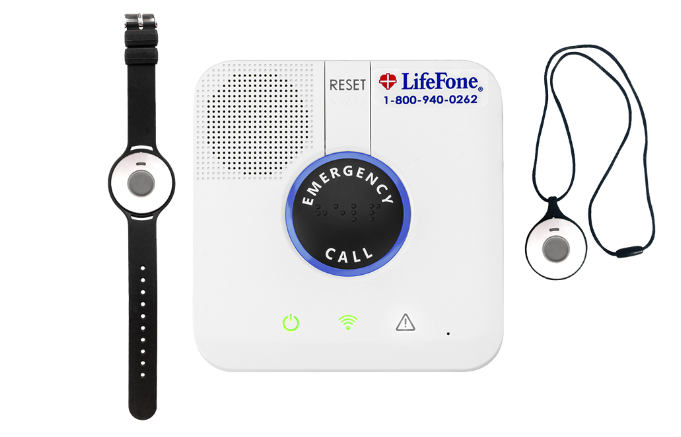
- Plan costs: $24.95 – $45.95
- In-home range: Up to 1,300 ft.
- Device type: In-home unit, pendant, bracelet, smartwatch
- Fall detection: Yes, $5/month
- Battery life: 24 hours – 10 days
- Response time: 15 seconds
LifeFone has provided reliable service to seniors nationwide for over 40 years. At the time of publishing, LifeFone has a rating of 4.7 out of 5 stars on Trustpilot based on over 900 customer reviews.
One of the things we like most about LifeFone is their consumer-friendly policies and the variety of incentives they offer first-time customers. This includes free shipping, a free lock box, one month of free service, and no activation or equipment fees with their purchase.
LifeFone offers six different systems, including in-home and on-the-go options. The pendants, bracelets, and smartwatches are sleek and lightweight for seniors who prefer more discreet devices.
We like that LifeFone home systems include temperature sensors, first-motion-of-the-day monitoring, step tracking, and on-demand device location. These features can be found in the Caregiver Mobile App, which costs an additional $8 per month.
For $19 per month, a LifeFone agent will call the subscriber daily to check in to monitor safety and provide medication reminders. As an alternative, for $6 per month, subscribers can initiate a check-in call with a LifeFone agent at a set time each day. The device will set off an alarm to remind the subscriber that it’s time to check in. If there is no contact within 15 minutes, an alert will be sent to the monitoring center, and an agent will make an outbound call to the home.
We also like that they offer free spouse monitoring with their in-home systems, with fall detection costing just $5 per spouse per month.
To learn more, read our comprehensive LifeFone review or view plan options on their website.
Lively
Great for Tech-Savvy Seniors
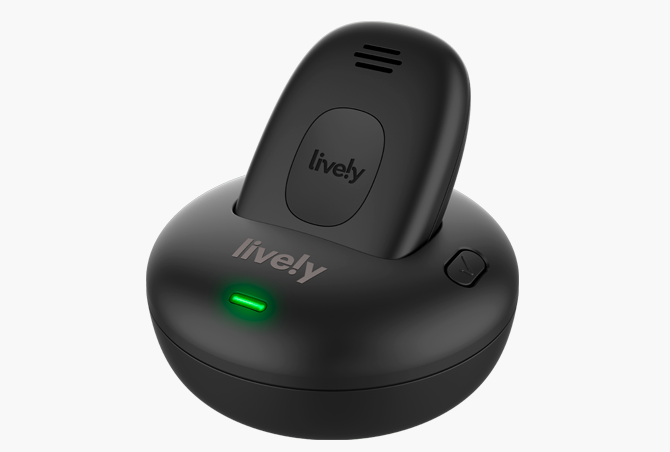
- Plan costs: $24.99 – $34.99
- In-home range: N/A
- Device type: Pendant, smartwatch, Amazon Alexa, Jitterbug phone
- Fall detection: Yes, $9.99/month
- Battery life: Up to 40 hours
- Response time: 15 – 20 seconds
Lively is a great option for tech-savvy seniors who already own a smartwatch or an interactive voice assistant. Their medical alert systems operate through an Apple Watch, Amazon Alexa device, or a Jitterbug cell phone.
The only medical alert device Lively offers is the Mobile2, which is a waterproof all-in-one medical alert button. It can be worn on your belt, pocket, or purse; however, if you opt for fall detection, it must be worn around the neck for accurate results. The Mobile2 has a one-time equipment fee of $79.99 on top of the cost of your monthly subscription plan.
We like that Lively offers free shipping and is FSA, HSA, and HRA eligible. We also like that they encourage seniors to contact them anytime they feel uneasy, even if it is not an emergency. For example, they encourage you to reach out if you smell a gas leak, experience chest pain, or even hear a strange noise around your home.
They offer two different subscription plans. The basic plan provides urgent response services and an “Ask Lively” feature that allows you to contact them anytime for help with your device, to look up a phone number, or even to get directions.
The premium plan includes the same features, in addition to their care advocate and nurse on-call services. The care advocate will help you create a personalized care plan to ensure you’re accomplishing your health goals, while the nurse on-call gives you access to medical advice from doctors or nurses anytime, including nights and weekends, at the touch of a button.
To learn more, read our comprehensive Lively review or view plan options on their website.
GetSafe Medical Alert
Great for Large Homes
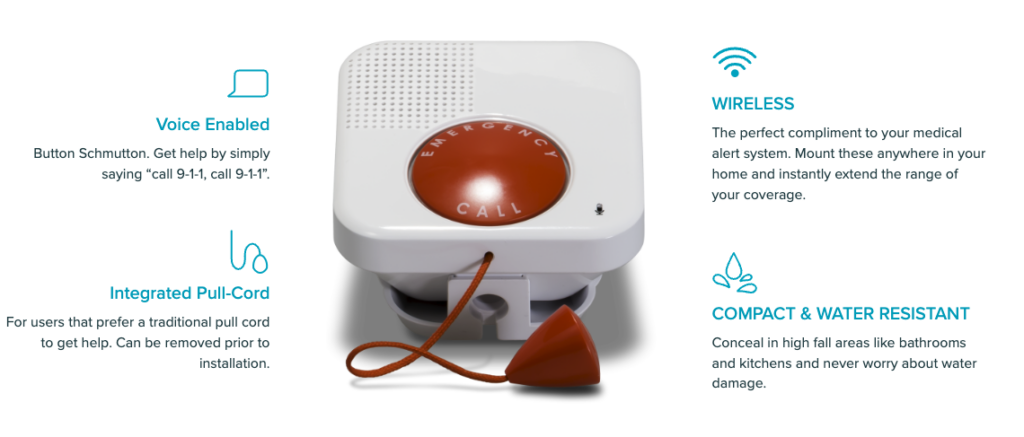
- Plan costs: $29.95/month
- In-home range: Up to 800 ft.
- Device type: In-home unit, optional wearable pendant
- Fall detection: Yes, $10/month
- Battery life: Up to 5 years
- Response time: 25 seconds
For seniors who prefer not to wear a button, GetSafe has designed a medical alert system with voice-activated technology, pull chords, and standard wall buttons.
Their in-home unit features a highly sensitive microphone and amplified speaker for clear two-way communication. The voice-activated wall button can be placed in high-risk areas around the home and activated by saying “call 911, call 911” or grabbing the bright red pull chord to dispatch assistance.
GetSafe is ideal for seniors who spend most of their time at home. Although it is a home-based system, it does not require a landline and can be connected using 4G LTE. They do offer wearable devices if you change your mind or want to keep one on hand.
The upfront cost of the equipment varies depending on the size of your home. It starts at $79 for one bedroom, $193 for two or three bedrooms, and $279 for four or five bedrooms. If you want a wearable device, they offer pendants for an additional $25 and fall detection for $10/month.
Their pendants only have an 800 ft. range, so GetSafe’s in-home system is best for seniors who spend most of their time at home and don’t typically wander too far from the house. However, they offer optional GPS pendants for a one-time fee of $99, plus $20 a month for monitoring.
To learn more, read our comprehensive GetSafe review or view plan options on their website.
Bay Alarm Medical
Great Customer Service
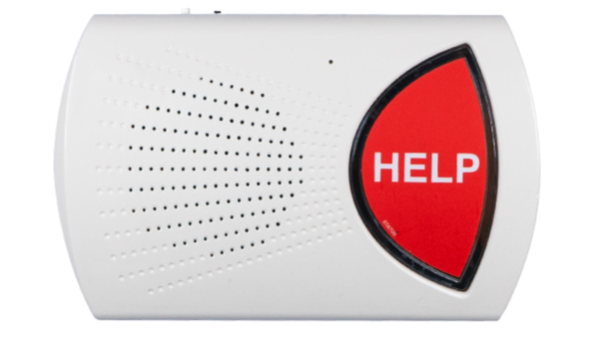
- Plan costs: $24.95 – $59.95
- In-home range: Up to 1,000 ft.
- Device type: In-home unit, pendant, smartwatch
- Fall detection: Yes, $10/month
- Battery life: 2 – 5 years
- Response time: 10 seconds
Bay Alarm Medical has been providing life-saving services to seniors for over 70 years. They have five different systems, including both in-home and mobile devices. They currently have 4.6 out of 5 stars on Trustpilot based on nearly 1,000 customer reviews. Customers appreciate their rapid response time and excellent customer service.
They offer a 30-day risk-free trial and will issue a full refund if you decide that their device is not right for you. They also offer free shipping and include a Vial of Life with your subscription, which records your personal medical information for EMS to use during an emergency.
Bay Alarm Medical home systems can operate via cellular or landline connections. Their mobile devices are available on both Verizon & AT&T networks and feature Wi-Fi location services, GPS tracking, and automatic fall detection.
They offer black, white, and four different stylish medical alert necklaces called “Bella Buttons”. For those who prefer bracelets, they offer “Bella Bands”, which are stretchy nylon wristbands that come in four different colors.
We like that their mobile systems can be connected to the Caregiver Tracking app, which can be used to create and manage your personalized safety plan, allows caregivers to track their loved one’s location anytime, and gives details about the device, such as battery power level and location history. The app also allows you to ring into your device if it is ever lost or misplaced.
We also like that they offer free spouse monitoring. Just purchase a second button for $39, and your spouse will receive 24/7 monitoring as well.
To learn more, read our comprehensive Bay Alarm Medical review or view plan options on their website.
Additional Medical Alert Companies
Aloe Care Health offers two medical alert systems at different price points. To learn more, read our Comprehensive Aloe Care Review.
MobileHelp offers some of the best technology to buyers, including automatic fall detection. Check out our MobileHelp review to learn more.
LifeStation’s On The Go mobile medical alert system features fall detection, enhanced location technology and a reminder that lets you know when batteries are running low. Read our LifeStation Review, to learn more.
Connect America offers a variety of medical alert systems, including fall detection, mobile systems and cellular and landline systems. Check out our comprehensive Connect America review.
Medical Care Alert offers five medical alert systems with varying features based on your situation. Check out our Medical Care Alert review for details.
Lively (formerly GreatCall Lively) offers an affordable waterproof medical alert system with excellent response time and top-notch customer service. Read our full Lively review.

In-Home vs. On-The-Go Medical Alert Systems
There are several types of medical alert systems: in-home and on-the-go. In-home medical alert systems work like a home security system — a base unit connects you to trained staff and a monitoring center. With in-home medical alert systems, you’ll plug the base unit into an outlet and wear the portable help button as a necklace, wristband, or pendant. These systems include battery backup in case of a power outage, but you’ll need to stay within range of the base system for it to work.
On-the-go medical alert systems use a cellphone to communicate with the help center, enabling you to carry the system away from home in the form of a necklace or watch. These systems have rechargeable batteries.
Pros and Cons of Medical Alert Systems
Medical alert systems are a valuable resource for seniors who want to age in place and maintain their independence. They provide a sense of security for seniors and peace of mind for family and friends.
We like that medical alert systems provide immediate access to help when a senior has fallen, is incapacitated, or is experiencing a medical emergency. They can help seniors remain independent and in their own homes for longer periods of time without sacrificing their safety. The 24/7 monitoring ensures that you have access to help around the clock, and the devices are typically designed to be user-friendly, easy to set up, and include straightforward instructions.
However, medical alert systems do come with both up-front and ongoing costs, which may be a hindrance for seniors on a budget or who are on a fixed or limited income.
From The Expert
“I have found the largest barrier is the user’s cognition, not only for use (charging the device, knowing how to press the buttons/being able to do so, remembering to press the button in an emergency) but also for managing the subscriptions. Before buying, consider who will use the device and whether cognition will play a role in its effectiveness.”
How Much Do Medical Alert Systems Cost?
| Brand | Monthly Subscription | Fall Detection | Equipment/Activation |
|---|---|---|---|
| Medical Guardian | $29.95 – $44.95 | $10/month | $149.95 – $199.95 (equipment only) |
| Personal Living Alert | $24.99 – $44.99 | $8/month | $99 for smartwatch activation |
| ADT Medical Alert | $29.99 – $39.99 | $11/month | N/A |
| Lifeline | $29.95 – $49.95 | $15/month | $99.95 |
| LifeFone | $24.95 – $45.95 | $5/month | N/A |
| Lively | $24.99 – $34.99 | $9.99/month | N/A |
| GetSafe | $29.95 | $10/month | $79 – $378 |
| Bay Alarm Medical | $24.95 – $59.95 | $10/month | $69.30 – $149 for mobile systems |
A monthly subscription generally costs between $25 and $60. However, many medical alert systems have additional expenses, including fees for equipment, activation, installation, fall detection, and accessories. If you opt to pay for an annual subscription, you can shave a few dollars a month off your price.
The lowest starting price for the monthly subscription costs for the best medical alert systems:
- LifeFone: $22.95 per month, with no equipment or activation fees.
- LifeFone: Most affordable fall deduction add-on service ($5 per month)
Additional Fees
- Fall detection
- Equipment, activation and installation
- Shipping:
- Additional equipment, such as extra pendants or wall buttons
- Lockboxes
- Protection plans
- Telehealth
- Cancellation
- Spouse monitoring
- Accessories (Bella Bands, Bella Buttons)
Features to Consider Before Buying
There are basic features you should expect from all medical alert devices, such as the ability to connect to a 24/7 monitoring center, pinpoint users’ locations, and water proof devices. But there are additional features you should compare across several brands to ensure you or your loved one has the protections they need.
In-home vs. On-the-go
At-home medical alert systems consist of a base station with a two-way speaker and a help button necklace or bracelet. Depending on the connection range, you can contact the monitoring center from anywhere in your home, including your backyard if the range extends that far.
However, we were surprised to learn that most in-home medical alert necklaces and bracelets dont have speakers. If you press it during an emergency, you may not be able to hear the call center from where you’re located. You can create an emergency response plan that asks the monitoring center to dispatch services even if they can’t speak with you.
On-the-go medical alert systems are either compact mobile devices or smartwatches. Running on cellular service, these devices call the monitoring center anywhere there’s a cell signal and have a built-in speaker to communicate with the monitoring center staff.
Some mobile systems and smartwatches connect to GPS, allowing caretakers and family members to check your location any time you’re wearing the device.
Range and Connection
This is the longest distance an at-home base unit can connect with your help button., and device ranges are typically between 300 and 2,000 feet. This includes multi-level homes. While you won’t need to consider range with on-the-go systems, they will only work in places where there is adequate cell signal.
Response Times
All of the best medical alert systems we evaluated have response times of one minute or less. The response time is how long it takes to connect and speak with a monitoring center professional after calling for help or triggering fall detection.
Be sure to coordinate your emergency response plan at the time of account setup, which will inform the call center of your preferred stages of communication. For example, you can request the monitoring center dispatch emergency services for every instance, or call a designated family member first.
Automatic Fall Detection
Fall detection technology is often integrated into medical alert systems, and we recommend purchasing the service if your budget allows. While research shows that medical devices don’t always detect every fall, having this type of monitoring can help protect seniors at risk.
However, it’s important to remember medical alert devices with fall detection typically require the user to press a button to engage a call center. Call center representatives told us that automatic detection only engages if the system doesn’t detect movement after a fall.
Battery Life
A long battery life is especially important for on-the-go systems. Most mobile system batteries last several days, with Medical Guardian, GetSafe, and Personal Living Alert lasting up to five days. Watch batteries should at least last a few days and necklaces and braceless last one to three years.
Overall, battery life also varies depending on cell signal strength and how much you use the device.
Battery life ins’t as important a consideration for at-home systems, since the base station stays plugged in. If there’s a power outage, most base stations include a backup battery.
Customer Service
The most common complaints from customers who have bought medical alert systems reference customer service issues, such as trouble canceling long-term contracts, issues getting broken equipment fixed, and a lack of response during emergencies. Before buying a system, research the warranties, maintenance plans, and contract details to ensure you know what to expect over the long term. All medical alert devices featured on this list have warranties.
Additional Features
- Water resistance
- GPS tracking
- Step tracking
- Medication reminders
- Home temperature monitoring
- Caregiver alerts
- Wall buttons
- Voice activation
- Telehealth
- First-motion-of-the-day monitoring
- Spouse monitoring
- Daily check-ins
- Lockbox
- Free shipping
- Free activation and installation
Frequently Asked Questions about Medical Alert Systems
Does Medicare cover medical alert systems?
No, Medicare does not typically cover medical alert systems. However, some Medicare Advantage plans may provide coverage for a temporary amount of time, after which you’ll incur any applicable fees.
Do you need Wi-Fi or a landline for medical alert systems?
Depending on the system you choose, your device will either require a landline, Wi-Fi, or a cellular network to function.
Can a medical alert system call family?
Yes, some medical alert systems can be set up to alert family and friends in the event of an emergency.
Concluding Thoughts on Medical Alert Systems
Bottom Line: A medical alert system can provide fast, 24/7 help from emergency responders.
Medical alert systems provide safety and independent living for people who live alone or couples in their retirement years. These devices offer fast assistance at any time of day. Automatic fall detection provides an additional layer of security should you become incapacitated. The latest technology turns some medical alert systems into a communication center.
Narrow your choices to one of our top companies to ensure you choose one of the best medical alert systems on the market.
The Best Medical Alert System Companies
| Medical Alert Company | Best For | Phone | |
|---|---|---|---|
| 1 | Medical Guardian | Wide Selection | 888-362-3950 |
| 2 | Personal Living Alert | Great Selection | |
| 3 | ADT Medical Alert | Great Plans | |
| 4 | Philips Lifeline | Popular System | (855) 945-6677 |
| 5 | Lifefone | Great Perks | (855) 337-5930 |
| 6 | Lively | Affordable Options | |
| 7 | GetSafe Medical Alert | Great For Large Homes | (866) 824-3461 |
| 8 | Bay Alarm Medical | Great Customer Service | |
| 9 | Aloe Care | Great Features | |
| 10 | MobileHelp | Great Technology | |
| 11 | Medical Alert | Great Service | |
| 12 | LifeStation | Great Value |
Related Medical Alert Resources
Readers of this medical alert guide content also read these related articles.
5 Best Medical Alert Systems with GPS (In-Depth Guide)
Medical alert systems come with various features depending on the type of system you buy. GPS tracking can help emergency response workers find you faster when you need help.
5 Best Medical Alert Systems With Fall Protection
Fall protection is automatic motion detection on wearable devices that can detect a fall, triggering a call to dispatch first responders.
Medical Alert Bracelets
Medical alert bracelets are a great option for letting first responders know your medical history at a glance. They come in styles ranging from casual to high-class gold, silver and white gold.
